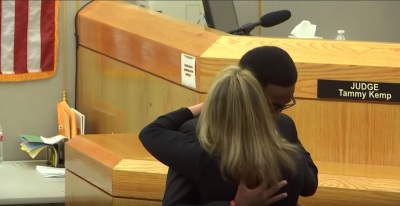Can a hug heal a nation?

The United States of America is divided. We are divided along political, religious, ethnic, and gender lines. Perhaps we are as divided as any time in our nation's history.
One of the great debates of our time lies in the division of justice in America and especially its impact on people of color. Cell phone videos of the use of force by police coupled with media accounts of the number of minorities held in state and federal prison systems have galvanized elected leaders, advocacy organizations, religious organizations, and private citizens to focus on reforming our justice system toward more fair and just outcomes.
In the past ten years, over 30 states have enacted reforms to their justice system, resulting in significantly declining crime rates across the country, steadily reducing prison populations, and increased safety in our communities. In the last year, the federal government joined this movement when Congress overwhelmingly passed, and President Trump signed into law, the First Step Act. Reform to the federal prison system was greeted as a rare moment of unity bridging our national divides.
But recently, our justice system once again was the backdrop for a national drama. Millions of Americans were glued to their screens watching the trial of former Dallas, Texas police officer Amber Guyger, who was in the process of being convicted of the September 2018 murder of Botham Jean, an unarmed African American man who was killed in his own apartment. The facts of the case were not in dispute. Guyger mistakenly entered Jean's apartment, believing it was her own, and shot and killed him. The only question for the jury was: murder or a mistake. The jury rendered its verdict that Guyger had murdered Jean and sentenced her to 10 years in prison.
But the most powerful moment of the proceeding came shortly after the sentence was pronounced. In one of the most poignant and powerful moments in recent American memory, Brandt Jean, the brother of Botham, took the stand to deliver his victim impact statement. In just over two minutes, Brandt Jean poured out his heart and eventually proclaimed to Guyger, “I can speak for myself, I forgive you. And I know if you go to God and ask Him, He will forgive you.” Brandt closed by asking Judge Tammy Kemp if he could hug his brother’s killer. Judge Kemp allowed it. The world watched as Brandt Jean and Amber Guyger embraced and wept in the well of the courtroom for all of America to see.
Justice is complicated. Human conflict is all around us. But can Brandt Jean’s response in the throes of the overwhelming flood of thoughts and emotions of that moment be a lesson for us in these divided times? As 18-year-old Brandt Jean rose from the witness stand and tearfully hugged Guyger, his unrehearsed and unexpected display of faith and love brought tears to a nation’s eyes and hope to a nation’s heart.
Indeed, our justice system can work for all Americans, and faith can play a significant role in our quest for justice and restoration. The acts of justice, humanity, and forgiveness displayed in a Dallas courtroom by Brandt Jean and Judge Kemp are not only consistent with the faith practiced by millions of Christians in our nation and around the world, but they also are consistent with the move toward a system of justice that is both just and fair. Because justice requires an account, but reconciliation requires forgiveness.
Let’s not allow the cynical voices of our current political divides to rob us of our chances at reconciliation, however few and far between they may be right now. Those few, loud voices of cynicism must not drown out the millions of voices calling out for restoration and healing. Thank you, Brandt Jean for demonstrating the incredible courage to forgive. And thank you Judge Tammy Kemp for having the wisdom to mete out justice, but to allow forgiveness to have its place. Here’s hoping a hug in a Dallas courtroom can help to heal our nation.



























